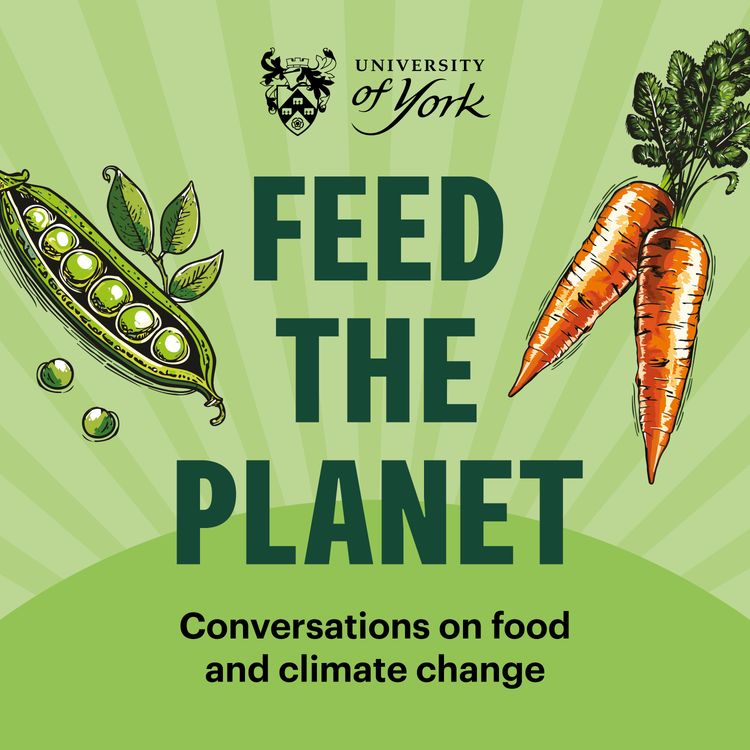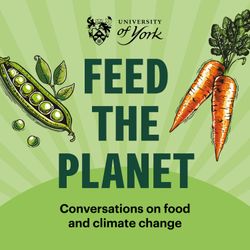Share

Feed the Planet - Conversations on Food and Climate Change
Raising Planet-Friendly Eaters: Sarah Bridle talks Kim Smith
So far in the podcast we’ve talked about how one of the key ways you can reduce the environmental impact of your diet is to eat more plants. But encouraging those around us to eat more vegetables and pulses isn’t always easy, especially if we’re talking about children. Whether you’re a parent or not, we all have an interest in encouraging the next generation to adopt a planet friendly diet. Which is why I was really keen to talk to Kim Smith, who’s a Trustee at TastEd, a charity that uses a sensory approach to introduce children to new foods. In this episode we discuss:
- How much veg kids are actually eating and how you can get them to eat more
- Why anyone who's ever said 'you just have to try it', has been getting it wrong!
- The importance of talking about what you don't like as well as talking about what you do like
You can find a full transcription of this episode on YouTube, expand the description box and click - show transcript.
This podcast was produced by Molly Watson, funded by the University of York, working with FixOurFood.
More about Kim:
Kim has more than 20 years of experience in the food industry, and is currently studying for a PhD examining food education policy, at City University of London. Kim is also a Trustee at TastEd, a charity that helps children to love eating vegetables and fruit through using the 5 senses.
Useful links:
https://www.bbc.co.uk/programmes/w3ct1rfr
https://www.bera.ac.uk/blog/my-first-conference-view-from-a-phd-student
Papers / data mentioned:
Effect of sensory education on willingness to taste novel food in children
Stats about vegetable consumption from Food Foundation
Kim’s own MSc research into primary school food education policy around the world
More episodes
View all episodes

A Guide to Climate Friendly Food Choices: Sarah Bridle talks to James Hand
19:32|When we set out to make this podcast we wanted to provide some facts and figures for anyone navigating the complexities of trying to adopt a more climate friendly diet. We wanted to explore the changes you can make that have the biggest impact, but also to discuss why these changes aren’t always easy.My guest today is James Hand, co-founder of Giki, an app which aims to help people understand and reduce their carbon footprint. James has made it his mission to help individuals trying to negotiate these complex choices. In this episode we discuss:Why what you eat matters more for the environment than where your food has come fromHow much packaging and transport contribute to the carbon footprint of your foodFood labels and other things that could make life easier for climate friendly shoppersWhy the choices you make, make a differenceYou can find a full transcription of this episode on YouTube, expand the description box and click - show transcript.This podcast was produced by Molly Watson, funded by the University of York, working with FixOurFood.More on James:James Hand co-founded Giki with his wife Jo to help people cut carbon emissions. Giki, a mission-driven B-Corp, has worked with over 100 businesses to engage their employees on sustainability and helped over 100,000 people to take action at home and at work across 100 countries. James has worked in sustainability for almost 20 years and was previously Co-Chief Investment Officer at Ninety One Asset Management. James specialises in the intersection between carbon footprints and behaviour change.Useful links:James on LinkedInGikiOur World in Data: Food Choice vs Eating Local
Why What We Eat Matters for Climate Change: Sarah Bridle talks to Dave Reay
28:19|At this stage in the series we wanted to take a step back to ask the questions:How important is food when it comes to climate change?How much difference can individuals actually make?And if we are going to change the way we eat, how can we do this in a way that’s just and fair to everyone? In this episode I talk to Professor Dave Reay, Chair in Carbon Management at the University of Edinburgh and author of several books on exactly these topics. Dave talks to me from his farm on the Mull of Kintyre, where he’s planting trees and trying to remove his family’s carbon footprint.A full transcription of this episode is available on YouTube,This podcast was produced by Molly Watson, funded by the University of York, working with FixOurFood.If you have enjoyed this podcast please like, subscribe and leave a review.More about Dave:Professor Dave Reay is Co-Chair of the Just Transition Commission which advises the Scottish Government and has just stepped down as Director of the Edinburgh Climate Change Institute. As well as being a leading researcher, Dave is the author of several books including “Your Planet Needs You! A Kid’s Guide to Going Green' and “Climate-smart Food” which examines the contribution and resilience of popular foods to climate change.Useful links:Dave on LinkedInClimate - Smart FoodClimate change begins at homehttps://blogs.ed.ac.uk/davereay/home/Our World in DataUseful links from Sarah BridleSarah’s websiteFood and Climate Change Without the Hot Air
Balancing Human and Planetary Health: Sarah Bridle talks to Barbara Bray
25:57|There are a whole range of factors that affect the food choices that people make every day. Time and convenience, how much money we’ve got, our taste preferences - as well as the environmental impact. But we can't really discuss planetary health without talking about human health, which is why I was really keen to talk to my guest today, Barbara Bray. Barbara is a PhD researcher in healthy ageing diets at Queen’s University Belfast. She’s also director of Alo Solutions - a consultancy which helps businesses develop sustainable nutrition strategies and is a registered nutritionist.In this episode we discuss:What you need to think about in terms of nutrition if you’re considering adopting a more climate friendly diet.The cross-over between foods that are good for humans and the planetHow what we eat changes as we ageThe barriers to choosing healthier foodsA full transcription of this episode is available on YouTube.This podcast was produced by Molly Watson, funded by the University of York, working with FixOurFood.If you have enjoyed this podcast please like, subscribe and leave a review.Notes:More about Barbara:Barbara has 25 years experience in the food industry including working on the nutritional quality of products. In 2019 Barbara was awarded an MBE for services to food nutrition and last year did an internship in the UK government in the Defra team looking at policy on healthy diets. Barbara is currently researching for a PhD in healthy ageing diets at Queen’s University Belfast. She’s also director of Alo Solutions - a consultancy which helps businesses develop sustainable nutrition strategies. Barbara is a registered nutritionist and is also host of the Women Positively Ageing podcast.Useful links:Barbara on LinkedInBarbara on TwitterBarbara on InstagramAlo solutionsWomen Positively Ageing podcastEating sustainably | British Nutritional FoundationFSA Survey: Food and You 2Eatwell GuideTEDx - Diet, Diversity and the Future of FoodTEDx - 'What Youth Can Teach us About Positive AgeingUseful links from Professor Sarah BridleSarah's websiteFood and Climate Change Without the Hot Air
Cooking and Climate Change: Sarah Bridle talks to Christian Reynolds
24:49|When we talk about greenhouse gas emissions and food, we usually focus on food production, but these estimates often only tell the story as far as the farm gate or the retailer. How important are the choices we make in our own kitchens? Studies have suggested that home cooking can account for as much as 60% of the total emissions associated with certain foods. In this episode I’m talking to Dr Christian Reynolds, Reader in Food Policy at the Centre for Food Policy at City, University of London, and a global expert on food loss and waste, and sustainable diets.We discuss:The environmental impact of different cooking methodsWhich appliances produce the most and least emissionsThe significance of cooking compared to other factorsA full transcription of this episode is available on YouTube.This podcast was produced by Molly Watson, funded by the University of York, working with FixOurFood.Notes:More about Christian:Christian is also the Senior Tutor for Research at the Centre for Food Policy at City and leads the UK Food Systems Centre for Doctoral Training at the university. Christian has worked on food waste and sustainable diets in Australia, New Zealand, Indonesia, the UK, US and Europe, and is the lead editor of the Routledge Handbook of Food Waste (2019). Christian is also an adjunct Research Fellow at the Institute for Sustainable Food, University of Sheffield, and at the Barbara Hardy Institute for Sustainable Environments and Technologies, University of South Australia.Useful links:Christian on LinkedInChristian on XFSA - cooking your food - safety adviceChill the Fridge OutWonderbagHow to cook a more sustainable Sunday roast - The ConversationImpacts of home cooking methods and appliances on the GHG emissions of food - Nature Food JournalThe Food Programme - Low Energy Cookers: Fad or Food for Life? - BBC SoundsHow much could you save by not using your oven? - BBC NewsUseful links from Professor Sarah BridleSarah's websiteFood and Climate Change Without the Hot Air
The Environmental Impact of Plant Milk vs Dairy: Sarah Bridle talks to Rosie Green
21:51|One of the things I get asked about a lot is plant milks, how they compare to dairy and how they compare to each other. The best person to discuss this with is Professor Rosie Green, Chair in Environment, Food and Health at the London School of Hygiene & Tropical Medicine. Rosie is a world leading researcher on the link between diets, the environment and human health.In this episode we discuss:The rise of plant based alternative foodsHow their environmental impact compares to meat and dairy productsThe role of plant-based alternatives in transitioning to more sustainable dietsThe challenges and barriers that prevent more people adopting these alternativesYou can find a full transcription of the podcast on YouTube.This podcast was produced by Molly Watson, funded by the University of York, working with FixOurFood.If you have enjoyed this podcast please like, subscribe and leave a review.More about RosieRosie Green is Professor at the London School of Hygiene & Tropical Medicine. Rosie is head of the Planetary Health Group in the Department of Population Health and is also Co-Director of the London School of Hygiene & Tropical Medicine Centre on Climate Change and Planetary Health. Rosie also co-leads the Pathfinder Initiative which aims to provide practical, evidence based pathways to net zero through transformative local, regional and global actions and in 2020 was a member of the scientific panel for the UK Citizens Assembly on Climate Change.Useful links:Rosie on LinkedInThe role of plant based alternative foods in sustainable and healthy food systemsBroken Plate, Food FoundationThe future of dairy and meat consumption in the UKCentre on Climate Change and Planetary HealthPathways to a healthy net-zero future: report of the Lancet Pathfinder CommissionMapping the evidence of novel plant-based foods: a systematic review of nutritional, health and environmental impacts in high-income countries Useful links from Professor Sarah Bridle:Sarah Bridle's websiteFood and Climate Change Without the Hot Air